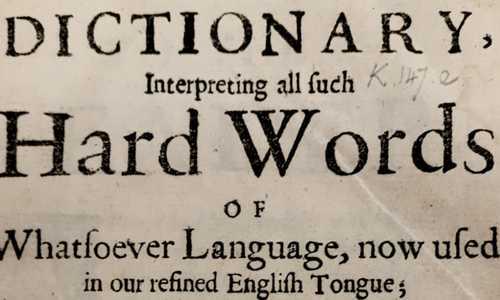Why is the English spelling system so weird and inconsistent? | Aeon Essays
Curated from: aeon.co
Ideas, facts & insights covering these topics:
6 ideas
·1.65K reads
25
1
Explore the World's Best Ideas
Join today and uncover 100+ curated journeys from 50+ topics. Unlock access to our mobile app with extensive features.
The Language Everyone Uses Is Weird
The English language is a universal tool for communication and is mastered even by non-native speakers. The many inconsistencies, quirks and complexities found in English can be confusing and highly frustrating for millions, both in verbal and written formats.
Other languages like French may have complexities like silent letters or certain complex rules, but nothing beats the English language, where letters, combination of letters and pronunciations follow hundreds of different rules and contradictory spellings.
23
415 reads
The Messy History Of English Language
The long travels of Anglo-Saxon tribes in the 5th Century, the Viking invasions a few centuries later and the Norman Conquest in the 11th century ensured that the wandering English men transmuted their language without any oversight or direction.
The English language basically picked the pockets of other languages and kept their vocabulary.
20
288 reads
The Timing Of Technology
The rise of the printing press coincided with the time when the rules and norms that linked the verbal and written formats of various languages were easily hijacked by powerful imperatives.
The adoption of the alphabet and the conversion of English using Latin alphabet was undertaken by monks and missionaries in the 6th century, mainly so that the religious texts could be read aloud to an illiterate public.
Certain sounds from the old English didn’t translate well, as Latin didn’t have them, resulting in workarounds and borrowed words from french.
20
243 reads
Reading Is Visual
Iff vee trai tu reed fonetickally it looks wrong to the mind, as reading is not based on how words are pronounced but how they are seen by the reading eye.
How fast we read depends on how quickly we are able to visually identify words, which relies heavily on our exposure to the same.
22
248 reads
A Crowdsourced Language
Certain words having different vowel pronunciations went through natural, unchecked pronouncing or spelling mutations, establishing themselves in the vocabulary due to the number of people using them, something which came to be known as the great vowel shift.
Words, spellings and pronunciations were mutated during writing, travelling, printing, reading and distributing, a phenomenon that created numerous irregularities and variations.
Example: The word name is pronounced nayymm, but earlier it was pronounced naam, having the same vowel and pronunciation as the word father.
21
231 reads
The Technology Of Writing
Speaking, writing and the human use of language itself can be termed by some as ancient technology. It is a natural inclination among humans due to the need to socialize and express themselves, and as a solution to the practical problem of communication.
It is only recently that we have so many literate people in the world who can understand all the writings, fueled by the printing press, widespread use of books and more recently, the internet.
20
231 reads
IDEAS CURATED BY
Mitchell Caldwell's ideas are part of this journey:
Learn more about artsandculture with this collection
Different Easter traditions around the world
The significance of Easter eggs and bunnies in modern culture
The importance of the holiday in the Christian faith
Related collections
Similar ideas
Read & Learn
20x Faster
without
deepstash
with
deepstash
with
deepstash
Personalized microlearning
—
100+ Learning Journeys
—
Access to 200,000+ ideas
—
Access to the mobile app
—
Unlimited idea saving
—
—
Unlimited history
—
—
Unlimited listening to ideas
—
—
Downloading & offline access
—
—
Supercharge your mind with one idea per day
Enter your email and spend 1 minute every day to learn something new.
I agree to receive email updates

